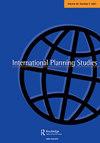A systematic review of shrinking cities literature: lessons from the past and directions for the future
IF 1.5
Q4 REGIONAL & URBAN PLANNING
引用次数: 3
Abstract
ABSTRACT This study sheds light on the state of knowledge on shrinking cities over the past four decades by identifying major thematic clusters, conceptual evolutions, and key players. The bibliometric analysis tools of VOSviewer and SciMAT were used to analyze 562 documents indexed in the Scopus and Web of Science (WoS) databases. The publication trend was divided into three subperiods: the genesis period (1978–2004), the growth period (2004–2015), and the rapid growth period (2015–2021). The most significant conceptual evolution in the field occurred between 2004 and 2015. Three thematic clusters were identified: (1) urban policy and planning, (2) physical and ecological planning, and (3) demographic and regional development. This review highlights that issues related to governance and regional, physical, and ecological planning have attracted more attention. Moving beyond past research, we provide four promising areas for further research in shrinking city studies.对萎缩城市文献的系统回顾:过去的教训和未来的方向
摘要本研究通过确定主要的主题集群、概念演变和关键参与者,揭示了过去四十年来缩小城市的知识状况。使用VOSviewer和SciMAT的文献计量分析工具对Scopus和Web of Science(WoS)数据库中的562篇文献进行了分析。出版趋势分为三个亚时期:起源期(1978–2004)、增长期(2004–2015)和快速增长期(2015–2021)。该领域最重要的概念演变发生在2004年至2015年之间。确定了三个专题组:(1)城市政策和规划,(2)物质和生态规划,以及(3)人口和区域发展。这篇综述强调,与治理和区域、物理和生态规划有关的问题引起了更多的关注。在过去的研究之外,我们为缩小城市研究提供了四个有前景的进一步研究领域。
本文章由计算机程序翻译,如有差异,请以英文原文为准。
求助全文
约1分钟内获得全文
求助全文
来源期刊

International Planning Studies
REGIONAL & URBAN PLANNING-
CiteScore
4.60
自引率
4.80%
发文量
20
期刊介绍:
Planning, at urban, regional, national and international levels, faces new challenges, notably those related to the growth of globalisation as both an objective socio-economic process and a shift in policy-maker perceptions and modes of analysis. International Planning Studies (IPS) addresses these issues by publishing quality research in a variety of specific fields and from a range of theoretical and normative perspectives, which helps improve understanding of the actual and potential role of planning and planners in this context.
 求助内容:
求助内容: 应助结果提醒方式:
应助结果提醒方式:


